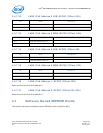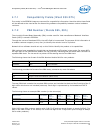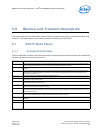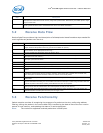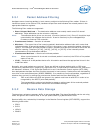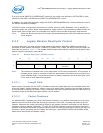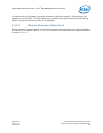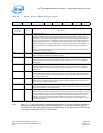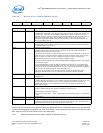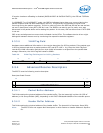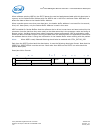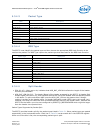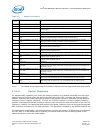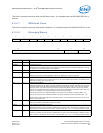
Intel
®
82575EB Gigabit Ethernet Controller — Legacy Receive Descriptor Format
Intel
®
82575EB Gigabit Ethernet Controller 324632-003
Software Developer’s Manual and EEPROM Guide Revision: 2.1
106 January 2011
Table 28. Receive Status (RDESC.STATUS) Layout
Note: See Table 34 for a description of supported packet types for receive checksum offloading.
Unsupported packet types either have the IXSM bit set, or they don’t have the IPCS or
TCPCS bits set. IPv6 packets do not have the IPCS bit set, but might have the TCPCS bit set
if the 82575 recognized the TCP or UDP packet.
7 6 5 4 3 2 1 0
PIF IPCS TCPCS UDPCS VP IXSM EOP DD
Receive
Descriptor
Status Bits
Bit(s) Description
PIF 7 Passed In-Exact Filter.
Hardware supplies the PIF field to expedite software processing of packets. Software must
examine any packet with PIF set to determine whether to accept the packet. If PIF is clear, then
the packet is known to be for this station so software need not look at the packet contents. In
general, packets passing only the Multicast Vector (MTA) but not any of the MAC address exact
filters (RAH, RAL) has PIF set. In addition, the following condition causes PIF to be cleared:
The DA of the packet is a multicast address and promiscuous multicast is set (RCTL.MPE = 1b).
The DA of the packet is a broadcast address and accept broadcast mode is set (RCTL.BAM =
1b).
A MAC control frame forwarded to the host (RCTL.PMCF = 0b) that does not match any of the
exact filters, has the PIF bit set.
IPCS 6 IPv4 Checksum Calculated on Packet
If active, hardware provides IPv4 checksum offload.
TCPCS 5 TCP Checksum Calculated on Packet.
Hardware provides an IPv4 checksum offload if IPCS is active and TCP checksum is offload. A
pass/fail indication is provided in the Error field - IPE and TCPE. See Table 31 for supported
packet types.
UDPCS 4 UDP Checksum Calculated on Packet.
Hardware provides an IPv4 checksum offload if IPCS is active and UDP checksum is offload. A
pass/Fail indication is provided in the Error field - IPE and TCPE. See Table 31 for supported
packet types.
VP 3 Packet is 802.1q (matched VET).
The VP field indicates whether the incoming packet's type matches VET and VLAN field is strip
(For example, if the packet is a VLAN (802.1q) type). This bit is set if the packet type matches
VET and CTRL.VME is set.
IXSM 2 Ignore Checksum Indication.
When set to 1b, hardware does not provide checksum offload. Software device driver should
ignore the IPCS, TCPCS, and UDPCS bits.
EOP 1 End of Packet.
Packets that exceed the receive buffer size span multiple receive buffers. EOP indicates whether
this is the last buffer for an incoming packet.
DD 0 Descriptor Done.
indicates whether hardware is done with the descriptor. When set along with EOP, the received
packet is complete in main memory. Software can determine buffer usage by setting the status
byte to 0b before making the descriptor available to hardware and checking it for non-zero
content at a later time. For multi-descriptor packets, packet status is provided in the final
descriptor of the packet (EOP set). If EOP is not set for a descriptor, only the Address, Length,
and DD bits are valid.



